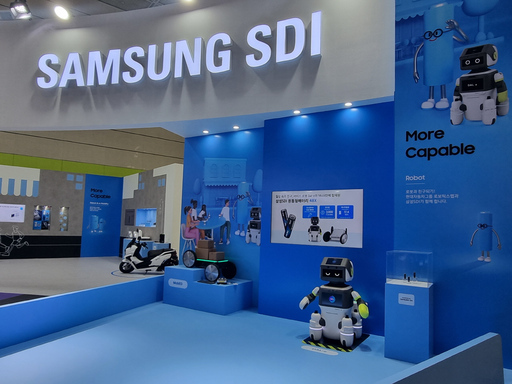


Domestic battery companies are accelerating the development of related technologies in response to the rapid expansion of the robot battery market. However, Chinese companies are leading not only in battery development but also in the production of complete robot products, raising concerns that domestic companies may struggle to close the competitive gap.
According to industry sources on the 31st, following China’s CATL, the world’s largest electric vehicle battery manufacturer, EVE Energy of China has also secured a foothold in the humanoid robot battery market based on generative AI, intensifying competition in the robotics industry. In particular, as there are only a few companies with substantial competitiveness in the humanoid robot battery sector within the global battery industry, it is becoming increasingly important to secure a competitive advantage in this market. Morgan Stanley, a U.S. financial holding company, has identified only four companies—EVE Energy, CATL, LG Energy Solution, and Samsung SDI—as key players in this field.
CATL is pushing forward with the development of smart factories by manufacturing industrial robots and deploying them in manufacturing environments. To this end, the company has established a robot team in Shanghai, China, dedicated to independently developing industrial robots. The team, consisting of dozens of members, is currently focusing on the development of ontology and control technologies, as well as algorithms for human-computer interaction, which enable robots to understand their environments. EVE Energy is also working on building a battery system that covers the "ground-low altitude-humanoid" areas.
Domestic battery companies are also embarking on the development of batteries specifically for robots. Samsung SDI has partnered with Hyundai Motor and Kia to jointly develop robot-specific batteries. The two companies plan to optimize the battery form factor while improving output and extending usage time. LG Energy Solution signed a contract in November 2024 to supply 2170 cylindrical batteries to Bear Robotics, a company specializing in autonomous robot-based mobility platforms.
In contrast to the efforts of domestic companies, China is leading not only in battery development but also in the production of complete robot products that integrate these batteries. This raises concerns that the competitive gap between the two countries may widen further.
Industry experts widely agree that cylindrical batteries are the most suitable form factor for robots. As a result, domestic battery companies are expected to emphasize the advantages of cylindrical batteries. Cylindrical batteries are gaining attention due to their superior energy density, charging speed, thermal management, and safety. Moreover, their high modularity and flexibility in assembly are seen as a good match for the structural design of robots.
LG Energy Solution’s cylindrical batteries use high-quality NCMA cathode materials with aluminum for enhanced safety, and feature a safety-enhancing separator (SRS) coated with their proprietary ceramic technology, which improves overall safety. Samsung SDI has diversified its lineup of 46mm diameter batteries, offering four different models—'4680, 4695, 46100, 46120'—with varying heights (80mm, 95mm, 100mm, and 120mm) to meet diverse customer demands and optimize battery offerings.
An industry insider stated, "As the robot battery market is still in its early stages, domestic companies will need to develop differentiated strategies, such as high-performance batteries optimized for robots and efficient supply chain structures, to secure market share."
ChatGPT를 사용하여 번역한 기사입니다.


 Copyright ⓒ 메트로신문 & metroseoul.co.kr
Copyright ⓒ 메트로신문 & metroseoul.co.kr
Copyright ⓒ Metro. All rights reserved. (주)메트로미디어의 모든 기사 또는 컨텐츠에 대한 무단 전재ㆍ복사ㆍ배포를 금합니다.
주식회사 메트로미디어 · 서울특별시 종로구 자하문로17길 18 ㅣ Tel : 02. 721. 9800 / Fax : 02. 730. 2882
문의메일 : webmaster@metroseoul.co.kr ㅣ 대표이사 · 발행인 · 편집인 : 이장규 ㅣ 신문사업 등록번호 : 서울, 가00206
인터넷신문 등록번호 : 서울, 아02546 ㅣ 등록일 : 2013년 3월 20일 ㅣ 제호 : 메트로신문
사업자등록번호 : 242-88-00131 ISSN : 2635-9219 ㅣ 청소년 보호책임자 및 고충처리인 : 안대성